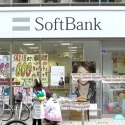Big overseas bets skewer Japanese telcos
SoftBank and Rakuten report losses on investments in US firms, but one is a far more troubling prospect than the other.

It started off as a fair impersonation of a disgraced samurai. "My judgement in investment was not right in many ways," said SoftBank CEO Masayoshi Son during a presentation to analysts and investors last week about his company's dire third-quarter performance.
After recording a profit of 542.6 billion Japanese yen ($5 billion) a year earlier, SoftBank slumped to a JPY645.3 billion ($6 billion) loss. A disastrous bet on WeWork, a company that rents out office space, and engine problems at Uber were to blame.
Similarly, Rakuten, an ecommerce giant with about 100 million customers, revealed a JPY114.7 billion ($1.1 billion) third-quarter loss, compared with a JPY43.2 billion ($400 million) profit a year earlier. The dwindling value of its investment in Lyft, an Uber rival, was partly responsible. Rakuten also lost money at its mobile telecom business, which is pumping money into a brand new 4G and 5G network.
Both companies have looked to overseas investments for growth. Rakuten's Japanese mobile network is built with expertise provided by Altiostar, a US software company that Rakuten helps fund. Yet SoftBank looks by far the more daringly ambitious. Its Vision Fund is a $100 billion investment vehicle betting on everything from AI chips to WeWork, a property company with only the most dubious technology connections.
The Vision Fund's investment strategy has swiftly become one of the most controversial in history. That is partly because of the megalomaniacal Son and the level of control he exerts over the business. Son's control can be seen even when SoftBank reports results. Most earnings calls feature a panel of executives speaking with analysts. SoftBank's is an interminable monologue by the Japanese billionaire followed by a short Q&A. No other executive gets airtime.
Recently, Son's bets appear to have displayed all the judgement of a drunk Vegas gambler down to his last few cents. Amid concern about sources of funding and corporate governance, WeWork received $9.5 billion in a SoftBank bailout after it lost nearly $1 billion in the first six months of 2019. In August, Uber flagged a $5 billion quarterly loss, despite rising take-up of its services. Uber's share price has lost more than a third of its value in the last year.
In the meantime, SoftBank Group's debts have soared to about $127 billion, after deducting net cash, making it one of the world's most heavily indebted companies. This might not seem like a problem given the huge valuations attached to companies in which SoftBank invests. Yet underperformance at several of these businesses puts the Japanese firm in a risky position. It is not just Uber and WeWork, either. ARM, a chip designer, Sprint, a US telecom operator, and Brightstar, a devices distributor, all reported dwindling third-quarter sales.
For all the latest news from the wireless networking and services sector, check out our dedicated mobile content channel here on Light Reading.
Son's contrition was short-lived during his rambling speech to analysts. Defending his strategy, he dismissed the financial metrics that analysts usually consider when assessing a company's underlying performance. "Revenue, profit -- those are not the measurements that I'm looking at when I run the business anymore," he said. "The most important measurement for us is shareholder value." This financially engineered figure, which SoftBank defines as the equity value of holdings minus interest-bearing debt, was up JPY1.4 trillion ($12.8 billion) in the third quarter, to JPY22.4 trillion ($205 billion).
Rakuten makes for a more sympathetic story. Its investment in Lyft, which is engaged in a price war with Uber, led to a substantial third-quarter loss. But its mobile network plans represent the sort of bold leap into uncharted territory that is rarely seen in the conservative telecom sector. It is building a network based heavily on new software technologies that are in vogue but not straightforward to use, even for a so-called "greenfield" operator with no existing infrastructure. It is for that reason that Rakuten has become the most closely watched company in the industry.
If Rakuten's scheme works out, and gives it the benefits it claims, it could fast become a guide for other service providers trying to build new-look networks. Right now, the main lesson to take from SoftBank is that megalomaniacal billionaires do not always have the best vision.
Related posts:
— Iain Morris, International Editor, Light Reading
Read more about:
AsiaAbout the Author(s)
You May Also Like












